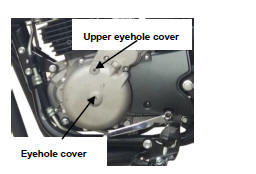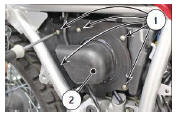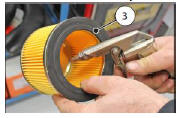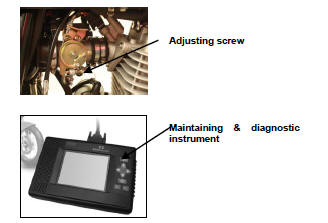 Mash Dirt Track 650 - Owner's Manual > Valve Clearance & Adjustment
Mash Dirt Track 650 - Owner's Manual > Valve Clearance & Adjustment
The valve clearance should be inspected and adjusted on a cold engine by the following procedures:
- Remove the caps of the central port and the ignition timing observation port on the left crankcase cover.
- Remove the caps of the valves on the cylinder head.
- Turn the nut of the flywheel clockwise until the engraved "T" mark on the flywheel aligns with the engraved line on the top of the crankcase cover, and both intake and exhaust rocker arms do not move but stop at their loosest position. This indicates that the piston is in its top dead center position of the compressing stroke. If the "T" mark is near the proper position but the rocker arms will move when the flywheel rotates within a small angle, the flywheel is not on the compression stroke but exhaust/intake stroke. In this case, continue to turn the flywheel clockwise 360 degrees to reach top dead center position of the compressing stroke, where the valve clearance can be adjusted.
- Check the valve clearance by inserting a clearance gage into the gap between adjusting screw and the end of the valve.
Valve Adjustment
Specified valve clearance:
Intake: 0.07-0.10mm
Exhaust: 0.08-0.12mm
If valve clearance adjustment is needed, loosen the locking nut on the rocker arm, insert the proper clearance gauge and turn the adjusting nut until a slight resistance is felt on the inserted clearance gage.
After adjustment, tighten the locking nut to prevent loosening and re-insert the valve gauge to re-check the valve clearance.
Reinstall the valve covers once final adjustment has been made.

Cleaning and replacement of air filter
Remove the air filter and check for contamination.
Open the right side cover. Remove the 4 right side filter cover screws
1 and, open the right cover2 and remove the air filter 3.

Cleaning
Clean the filter element by gently applying compressed air to dislodge dust and other debris.
Replace the filter if there are perforations or an excess build-up of debris that cannot be easily removed

Caution
The air filter must be installed or the engine will ingest dust and dirt, and an unbalanced air / fuel ratio resulting in a shorter engine life.
Water should never enter into the filter area if possible. Take special care when washing the motorcycle.
- Never clean the air filter with gasoline or any other solvents with a low flash point.
Idle Speed
Caution
Do not adjust idle speed without consulting your genuine dealer.
The XY650-A idle speed is controlled by the ECU. The idle speed has been properly adjusted upon delivery. Do not adjust the idle speed. In the event the idle speed is unsteady, zero or too high, bring the vehicle to a qualified genuine dealer to determine the possible causes via troubleshooting the EMS system. Your dealer will check whether the ignition advance angle is between 0º-15º. If the ignition advance angle is more than 15º, it indicates the throttle valve's intake flow at idle speed is insufficient, and at this point, the idle speed is unstable or null; if the ignition advance angle is less than 0º, it indicates the intake flow at idle speed is too high, and at this point, the idle speed is often as high as 1800 r/min or more. Only under the above two cases will the technician adjust the idle speed adjusting screw to let the intake flow reach the specified flow.

See also:
 Mash Dirt Track 650 - Owner's Manual > Spark Plug
Mash Dirt Track 650 - Owner's Manual > Spark Plug
Remove the spark plug cap, then remove the spark plug with a socket wrench. Visually check whether there is damage to the spark plug insulator or electrodes. If damage has occurred, replace the spark plug. Check the spark plug electrode gap with a plug gauge. Spark plug electrode gap 0.6 -0.7mm. Carefully adjust the electrode gap.
 Mash Dirt Track 650 - Owner's Manual > Throttle
Mash Dirt Track 650 - Owner's Manual > Throttle
Inspect the throttle cable for deformed, twisted or damaged locations along the cable length. Measure the throttle free-play. Tum the throttle against one side of the free stroke, and draw a straight line between the bar and the balance weight. Then turn the bar to lean it against the other side of the free stroke; measure the distance of the straight line, i.e. the throttle bar free stroke.

 BMW G310GS
BMW G310GS Honda CBR125RW
Honda CBR125RW Husqvarna 401 Vitpilen
Husqvarna 401 Vitpilen KTM 890 Duke R
KTM 890 Duke R Mash Dirt Track 650
Mash Dirt Track 650 Peugeot Kisbee
Peugeot Kisbee Yamaha Tracer MT-09
Yamaha Tracer MT-09 Honda CBR125RW
Honda CBR125RW Peugeot Kisbee
Peugeot Kisbee Yamaha Tracer MT-09
Yamaha Tracer MT-09